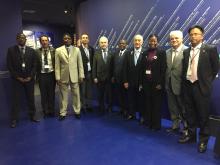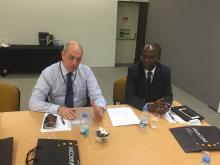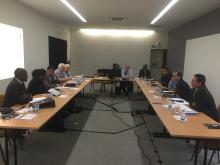Lisbon, Portugal (11-12 November 2015)
Purpose of Meeting
The Group on Capacity Building Initiatives (GCBI), held its 4th Meeting in Lisbon at Fundação Portuguesa das Comunicações - Museu das Comunicações, rua do Instituto Industrial. It was kindly hosted by Anacom.
The meeting was convened to appraise GCBI on the capacity building activities, as well as to develop a strategy to engage Academia in the capacity building work of ITU/BDT.
Two Documents were prepared and shared with the group in advance of the meeting. The first document updated the group on the main capacity-building activities being undertaken by the HCB division, as well as highlighted developments since the last meeting of the group in October 2014. The second document was a Concept proposing a concrete strategy and initiatives for engaging the Academia in the capacity building activities of ITU/BDT. It also justified the role of GCBI in this strategy, drawing on their mandate from Resolution 40 of WTDC-14.
Attendance
All the members of the Group attended the meeting except Mr Santiago Borda Reyes from the Americas, which gave his apologies, and Mr Narain from the Asia Pacific region.
Welcoming remarks for the meeting were given by Mr Jose Barros, Director External Relations, Anacom, representing the host, and Dr Cosmas Zavazava, Chief, Projects Support and Knowledge M Management, representing ITU/BDT, as well as by the Chairman of GCBI, Prof David Mellor.
Presentation of Capacity Building Activities within ITU/BDT
A PowerPoint presentation was made on the capacity building activities within the ITU, based on Document 2 submitted in advance; Highlights of this presentation were the following:
The work and progress on the development of standardized training materials. In this respect, details were shared on the work with respect to the development of:
- Spectrum management Training Program (SMTP) - A promotion video of the SMTP was played.
- Quality of Service Training Program (QoSTP).
- ICT and Climate Change Training Program (ICT and CCTP).
Capacity building through Partnerships. In this respect the meeting was appraised of activities jointly undertaken and/or planned with:
- Rohde and Schwarz in Spectrum monitoring.
- ITSO in Satellite communications, and
- ICTP in the area of Wireless networking.
The report also covered the partnerships entered into with UKTA with respect to delivery of the Masters of Communications Management (eMCM) program, and the Czech Technical University for the delivery of the Spectrum management Training Program (SMTP).
The meeting was also given an update on the actions implemented in support of the Centres of Eexcellence. Most important of this was the upgrade of the ITU Academy platform, and the new features and functionalities of the platform, such as the online payment capabilities.
Finally GCBI were briefed on the Global Capacity Development Symposium that is planned for September 2016. The event will be hosted by Kenya. GCBI, the Centres of Excellence and Academia are expected to play an important role during this event.
Finally, the meeting was appraised on the publication that was initiated by HCB, on “Skills Development, Lifelong Learning and Mobile Technology”. The publication is a product of contributions from renowned experts, most of whom are in the Academia. The publication has been approved internally within BDT, GCBI was requested to look at the publication and provide their comments.
During the ensuing discussions on this presentation, the following points were raised by members of GCBI:
- A mechanism needs to be put in place to inform Universities and other institutions of the programs developed so that they can express their interest. An email should be sent to these Universities to draw their attention to these opportunities.
- The existing limitation is the absence of a database of these institutions, and this limitation needs to be addressed.
- It is important to link the capacity building activities under the ITU Academy with Regional Initiatives. It was highlighted that, to a large extent, this was being done. Examples are the content development and training in Accessibility is directly linked to the Regional Initiatives in Europe and CIS regions.
- Development of courses should be continued in all areas, not only those mentioned as priorities at WTDC. Courses should be developed in areas such as Policy and Rregulation, Cybersecurity.
- Training materials developed and used in regional training activities should be sent to ITU regional offices so that they can be submitted to HCB.
- Every CoE should advertise the programs and activities of the other CoEs.
- The ITU Academy interface should be strengthened to assist new Users. People struggle with ‘How to pay“, for example. The Frequently Asked Questions is designed to address this.
- The University in Rabat expressed interest in working with ITU to implement a doctorate program in Spectrum Management.
- There are some problems with the collection of funds due to some restrictions, case in point being in the Arab region. Solutions have to be found for dealing with such challenges for the specific affected countries.
- The Mobile Learning publication should be distributed to members of GCBI who must provide their comments within two weeks of the meeting. The publication will then be reported together with other documents and developments during TDAG.
Engaging the Academia in ITU capacity building activities
Document 3 on Initiatives to strengthen collaboration with academia in capacity building activities was presented. The document proposed three interrelated strategies, namely:
- Development of a Trends in Capacity Building publication;
- Establishing an Online Dialogue Platform for the Academia;
- Convening a meeting of the Academia.
Proposals for a Trends in Capacity building publication was extensively discussed by the members, and some of the issues arising from this discussion related to whether this publication is to be treated as a registered publication; whether this is along the lines of a technical journal; whether it is a technical journal or an economic journal; whether it will be included in the web of Sciences Magazine index; whether it is to be in printed copies or online; whether it is for sale or free; whether it will be printed in all languages; What will be the editorial policy and editorial team? These questions will shed light on how Academia will view the publication or attract contributions from them.
In response, it was explained that the publication is not a technical or economic journal, but more of a Newsletter, providing an opportunity to share articles, research papers, and new thinking on ICT related topics and developments and how they relate to and/or affect capacity building. It’s an innovative way to have a voice for people who understand the human side of the ICT developments. An example was given of some Administrations that are not recognizing online qualifications/degrees, yet online learning is now part of “how we learn today”. Another example was ICT and Climate Change, or Big Data.
In this respect, issues of registration of the journal are not pertinent at this stage. This is why the appeal for contributions is to Academia, and in particular PhD students. The articles can then be subject for discussions and comments/contributions on the online platform dialogue, as well as at the Global Capacity Development Symposium. The publication will largely be online, but a few copies will be printed for promotion purposes.
The meeting agreed to produce this publication, with the first issue being a pilot.
With respect to establishing an online dialogue, this was linked to the publication. However, any other articles of interest may be put on the platform and discussed by the human capacity development community. Centres of Excellence would be encouraged to also share experiences, case studies and discuss issues on this dialogue platform.
It was also proposed to have a forum for the Academia to discuss how they can contribute to capacity building and network and partner with Centres of Excellence. Academia will be invited to be a key component of the Global Capacity Development Symposium.
The meeting was informed that Kenya had agreed to host the Global Symposium, and tentative dates were from 5-7 September. GCBI was expected to play a key role in this Symposium, and to mobilize participation from their regions. More details would be shared.
After very detailed discussions on the above issues, GCBI made the following decisions:
- HCB shall produce a publication on “Trends in Capacity building”, focusing on human issues associated with the ICT sector under the guidance of GCBI. This publication will be based on contributions of scholastic and/or research articles by the Academia and papers made by PhD students. However, this publication is not a scientific journal, nor a magazine to be registered in the web of sciences.
- The first publication will be on a pilot basis. Initially the publication will be on an annual basis.
- Contributions to the publication should be a maximum of 3000 words.
- Each publication will be made up of four articles/contributions;
- Members of GCBI are requested to submit short abstracts from any interested party by 30th November 2015. ITU (HCB) will send a request to GCBI members to this effect. The abstract must indicate the topic and the Contributor.
- The Chairman offered to submit four proposals; two from UKTA, one from University of Macedonia and one from Czech Technical University.
- Once the Abstracts have been submitted, they will be circulated to GCBI, who will select the four topics for which articles will be written. The four topics must be selected by 1 January 2016.
- The first publication shall be produced by end of April 2016.
- Considerations for a more formalized scientific publication can be made at a later stage, based on experience gained with this publication.
- Articles in this publication can be presented during the Global Capacity Development Symposium that takes place in Nairobi, Kenya, in September 2016.
- An Online Dialogue for the Academia can be a good opportunity for Academia to share knowledge and experiences, and discuss opinions on topics of common interest. Institutions such as Academia and Centres of Excellence can discuss their work, projects and case studies. This Dialogue platform shall be established on the ITU Academy platform.
- Academia should be fully tapped in to contribute to the work of Centres of Excellence. GCBI members can help introduce Academia to ITU Academy and its activities and potential for mutually beneficial collaboration.
- Partnerships between Academia and Centres of Excellence should be encouraged. Not all institutions that want to work with ITU were selected as Centres of Excellence.
- The Academia will be invited to be part of the Global Capacity Development Symposium. They can contribute to the forum discussions as well as exhibit their work and research projects in some sort of Academic Fair. The GCBI will take an active part in the Global Symposium.
- The participation of the Academia at the Global Symposium can be followed by meetings of the Academia at an event established for themselves annually where they can meet and network, and discuss on activities related to capacity building and human related issues.
- The Chairman mentioned that UKTA will sponsor two students to attend if selected to make presentations.
Resignation by Chairman of GCBI
At the end of the meeting, the Chairman of GCBI announced to the meeting that due to health reasons, he was resigning as Chairman of GCBI. He had already notified the Director of BDT. He thanked all the members for the support he had received from them during the time he was Chairman of group, and offered to keep supporting the work of the group remotely.
Members of the group took turns to thank Professor Mellor for having been an exemplary and inspirational Chairman, and wished him well.
The meeting was closed with members endorsing the summary of the decisions of the group, which the Chairman went on to sign.
The Group was then taken on a tour of the Submarine Cable Museum by the Anacom Director of External Relations, Mr. Jose Barros.


